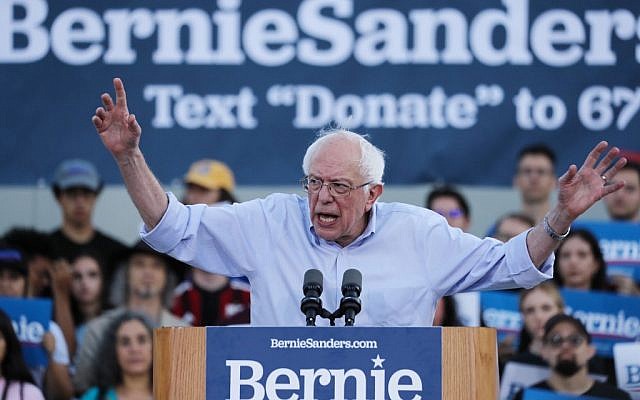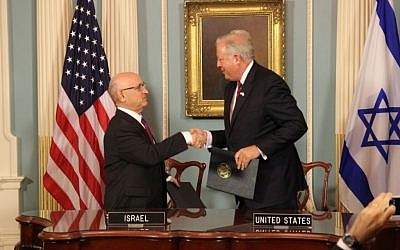Vermont senator and leading 2020 Democrat says he is not anti-Israel, but insists US’s Mideast policy cannot just be ‘pro-Israel pro-Israel pro-Israel’

WASHINGTON — Vermont Senator Bernie Sanders, a leading 2020 Democratic candidate for president, would “absolutely” consider dangling cuts to American foreign aid to Israel as a tool to pressure Jerusalem.
The US provides Israel with some $3.8 billion in military assistance, but asked if he would “ever consider using that as leverage to get the Israeli government to act differently,” the Brooklyn native answered “Absolutely.”
Sanders, who is currently running in second in most Democratic primary polls, made the comments Friday to former Barack Obama speechwriter Jon Favreau on the popular Pod Save America podcast.

The candidate, who is Jewish and has spent time on a kibbutz in Israel, is considered to be more critical of Jerusalem than others running for the Democratic nomination.
He sought to contextualize his answer by saying that he would not make decisions that render Israel militarily vulnerable, but that would give the government a blank American check.
“I have family in Israel. I am Jewish. I am not anti-Israel,” he said. “Okay, I believe that the people of Israel have absolutely the right to live in peace, independence and security. End of discussion — that is what I fervently believe.”
But, he added: “I think what has happened is in recent years under Netanyahu, you have an extreme right-wing government with many racist tendencies.”
Sanders has previously referred to Prime Minister Benjamin Netanyahu as a racist, and he sharply condemned his agreement earlier this year that allowed for an anti-Arab racist party to enter the Knesset.
He has also been a strong critic of Israel’s settlement activity and West Bank presence. In June, he posed with IfNowNow activists holding a sign that read, “Jews Against Occupation.”
Our members in NH just asked @BernieSanders if he’s also an anti-Occupation Jew and looks like the answer is YES!
Learn more about us bringing the crisis of Israel’s military occupation over Palestinians to 2020 elections w/this exclusive from @Politico: https://t.co/JrGmtzDZE1 pic.twitter.com/IRhyLCMNgN
— IfNotNow🔥 (@IfNotNowOrg) Hunyo 29, 2019
On the podcast, Sanders said that the US policy toward Israel could not be one dimensional, but instead more holistically focused on what most serves the interest of the United States and the region, including the Palestinians.
“This is not easy stuff — to try to finally bring peace to the Middle East and to treat the Palestinian people with a kind of respect and dignity they deserve,” he said. “Our policy cannot just be pro-Israel pro-Israel pro-Israel. It has got to be pro-region working with all of the people, all of the countries in that area.”

Military aid packages to Israel have steadily increased since the mid-1980s, when they were first offered, and are considered a linchpin of the US-Israel alliance, and few American lawmakers have challenged the handouts. In September 2016, Obama and Netanyahu signed a memorandum of understanding upping the figure from $3 billion annually to $3.8 billion annually for the next 10 years, despite frosty ties between the two.

The aid package is seen in Israel as key to helping it maintain its qualitative military edge over potential threats in the region.
In April 2016, Sanders was one of 17 senators who did not sign a letter to Obama urging him to increase aid to Israel.
Sanders is not the first prominent Democrat to float the idea of cutting aid to Israel if it maintains policies that the US opposes on moral and political grounds.
In April, freshman congresswoman Alexandria Ocasio-Cortez was asked on Yahoo’s Skullduggery podcast if the US should consider recalibrating its Israel policy.

“I think so,” Ocasio-Cortez said. “I think these are part of conversations we are having in our caucus, but I think what we are really seeing is an ascent of authoritarianism across the world. I think that Netanyahu is a Trump-like figure.”
Cutting military or economic aid to Israel was, she said, “certainly on the table.”
The liberal Zionist group J Street credited her with expressing a “nuanced” opinion on American policy toward Israel.
“Nuanced position from @AOC in wake of Netanyahu annexation pledge: open up discussion of US-Israel relations,” the organization’s president Jeremy Ben-Ami tweeted. “J Street view: US can assure Israeli security w/o funding activities that run counter to US values, interests such as annexation, demolitions.”
As reported by The Times of Israel
